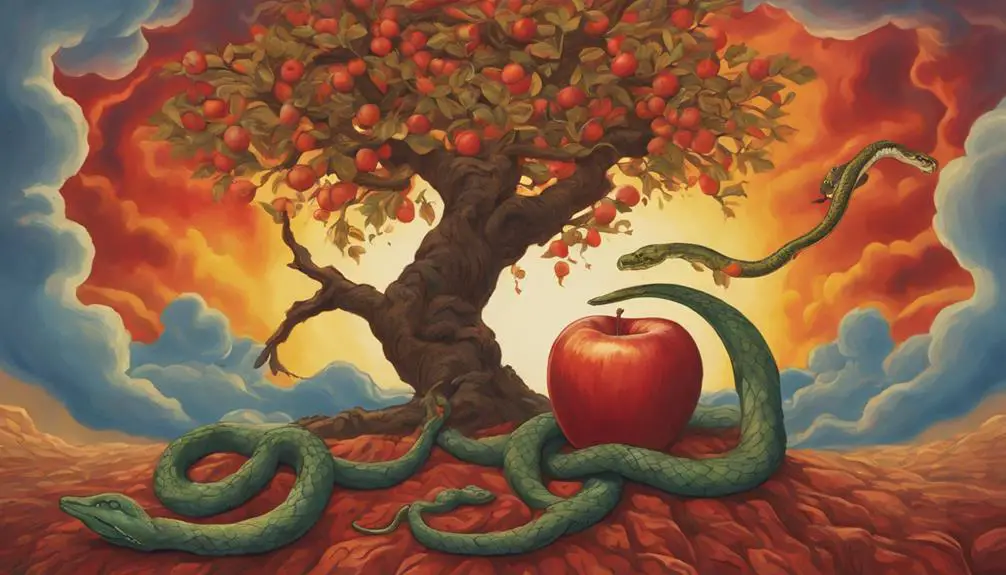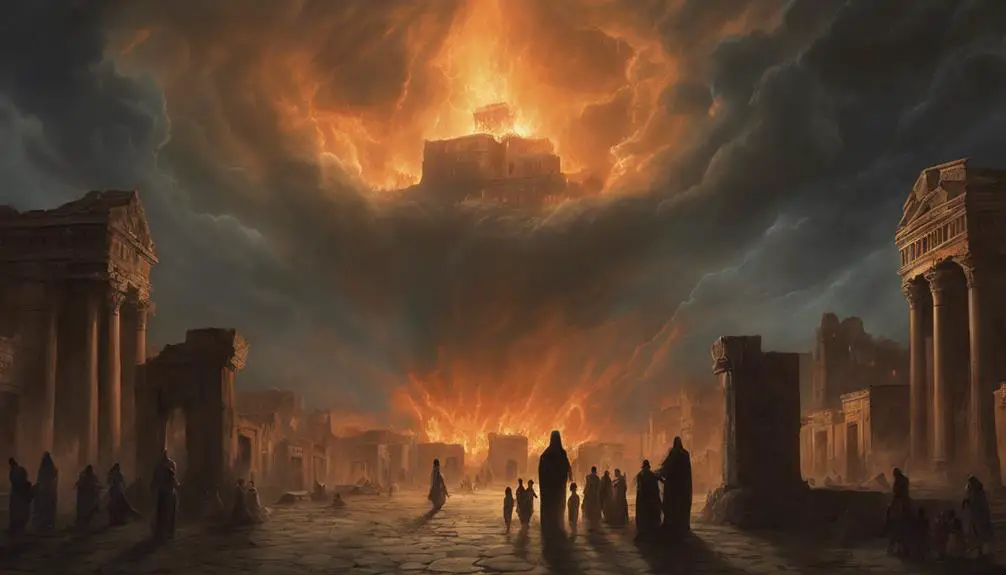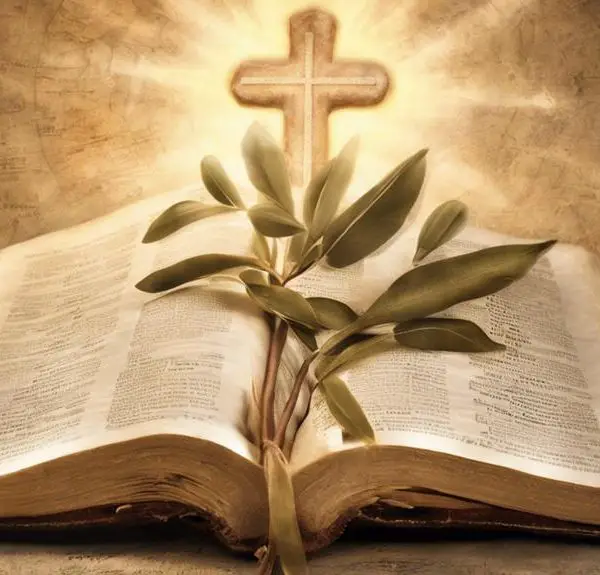Learn about the dual nature of divine judgments in the Bible, a fascinating exploration of God's wrath and mercy, and its relevance today.

2 Judgments in the Bible
You might not be aware of the dual nature of the divine judgments in the Bible. For instance, consider the Great Flood and the destruction of Sodom and Gomorrah. These events dramatically demonstrate not only God's wrath against sin but also his profound mercy.
This dichotomy poses intriguing questions about the nature of divine judgment and its implications for humanity. So why not ponder more on this concept? It could offer a fresh perspective on age-old biblical narratives and their relevance in today's world.
Key Takeaways
- The Great Flood and Sodom and Gomorrah highlight severe divine judgments for mankind's sins in the Bible.
- These judgments embody both God's mercy, through salvation and warnings, and His judicial nature.
- The consequences of disobedience in these biblical events underscore the gravity of defiance and need for redemption.
- The influence of these biblical judgments extends to modern beliefs, shaping societal norms and moral values.
The Great Flood: A Divine Judgment

Undeniably one of the most significant divine judgments documented in the Bible, the Great Flood serves as a poignant example of God's wrath and the consequences of humanity's disobedience. You might be intrigued by the Flood's aftermath, which offers a deep analysis of human morality and divine punishment.
The Ark, an integral symbol in this narrative, embodies salvation and refuge. Its construction, the collection of species, and its function during the Flood; all these elements reflect a divine plan and an opportunity for humanity's redemption. The Ark's symbolism extends to represent grace amid judgment, a beacon of hope amidst destruction.
In the Flood's aftermath, you see a stark contrast between a world that was steeply immersed in sin and a world washed clean, offering a fresh start. This contrast signifies the severity of divine judgments while also highlighting the possibility of rebirth and restoration.
Your comprehension of these narratives is enhanced when you delve into the symbolism and aftermath of the Flood, as they provide profound insights into divine judgment. Through this understanding, you grasp the gravity of humanity's actions and their repercussions, while also acknowledging the presence of divine grace and redemption.
Understanding the Consequences of Disobedience

To truly grasp the repercussions of disobedience, as depicted in biblical narratives, it's crucial to delve into specific instances where mankind's defiance led to severe divine judgment. The Bible is replete with examples that reveal the outcomes of disobedience, often showcasing spiritual rebellion against God's laws.
Consider the following table, summarizing some key incidents of disobedience and their respective outcomes:
Biblical Event |
Disobedience Act |
Disobedience Outcomes |
|---|---|---|
Adam and Eve |
Eating the forbidden fruit |
Banishment from Eden |
Cain's Murder of Abel |
Killing his brother |
Marked and sent to wander |
The Great Flood |
Humanity's wickedness |
Mass extinction, save Noah and family |
Tower of Babel |
Building to reach heaven |
Confusion of languages, dispersion of people |
Israelites' Golden Calf |
Idol worship |
Plague, subsequent repentance |
These instances illustrate the profound consequences of disobedience – not just physical or temporal, but spiritual, often resulting in separation from God. It's clear from these narratives that disobedience breeds spiritual rebellion, a condition that underlines mankind's fallibility and God's unwavering judgment. Understand this, and you'll begin to comprehend the gravity of defiance in the biblical context.
Sodom and Gomorrah: Punishment Unveiled

In the biblical narrative, the cities of Sodom and Gomorrah exemplify extreme disobedience, resulting in one of the most severe divine judgments – complete annihilation. This wasn't hasty destruction; rather, it was a calculated response to prolonged wickedness. The inhabitants' transgressions had reached such a level that it prompted a divine visitation, setting the stage for Sodom's downfall and Gomorrah's fate.
You might wonder about the nature of their sins. Biblical texts point to rampant immorality, unbridled greed, and gross disregard for the poor and needy. These weren't minor missteps; they were systemic, deeply rooted societal flaws that merited divine intervention.
Sodom's downfall is described vividly in Genesis 19:24-25. The Lord rained down burning sulfur, eradicating every living thing. The once-flourishing cities were reduced to smoldering ruins, serving as a potent reminder of the consequences of defying divine law.
Gomorrah's fate was no different. It too was consumed by the divine fire, its inhabitants wiped out, its existence erased. The punishment was severe, but the severity matched the magnitude of their sins.
Analysing God's Mercy Amid Judgment

While the punishments of Sodom and Gomorrah may seem severe, it's also crucial to explore the presence of God's mercy amid such judgments. Understanding mercy's definition and Divine compassion provides you with a clear perspective of God's actions.
Mercy, in its simplest form, is the compassionate treatment of those in distress. It's the act of showing kindness or forgiveness to humanity, specifically to those whom it's within one's power to punish or harm. When you think of Divine compassion, it embodies the ultimate expression of mercy – God's boundless love, grace, and forgiveness towards His creation.
In the midst of judgments, you can see His mercy manifest in various ways:
- God warned Lot and his family of the impending doom, enabling their escape.
- The spared life of Lot and his daughters showcased His mercy.
- God's willingness to spare the cities for the sake of ten righteous people.
- The aftermath of the judgment led to a renewed covenant with God, showing His mercy and longsuffering.
Impact of Biblical Judgments on Contemporary Beliefs

Biblical judgments' influence on modern beliefs cannot be overstated, as these ancient texts continue to shape many people's moral compass and religious convictions. It's evident that these judgments have a profound impact on Modern Morality, influencing principles of right and wrong. The concept of Divine Retribution, prevalent in the Bible, also shapes contemporary thoughts on justice and punishment.
Here's a table that evokes the connection between biblical judgments, modern morality, and divine retribution:
Biblical Judgment |
Impact on Modern Morality |
Divine Retribution |
|---|---|---|
The Fall of Man |
Introduced concept of sin |
Just punishment |
Noah's Flood |
Warning against immorality |
Divine cleansing |
Sodom & Gomorrah |
Stance against sexual immorality |
Swift destruction |
Judas' Betrayal |
Consequence of betrayal |
Personal downfall |
Crucifixion of Jesus |
Sacrifice and redemption |
Holy sacrifice |
These judgments pave the way for a system of moral values and beliefs that you adhere to. They establish a fear of divine retribution, instilling a sense of accountability for one's actions. Consequently, they're instrumental in shaping societal norms, legal systems, and religious doctrines.
Frequently Asked Questions
What Are Some Other Notable Judgments Mentioned in the Bible Apart From the Great Flood and Sodom and Gomorrah?"
You're pondering about significant judgments besides the Great Flood and Sodom and Gomorrah.
Well, you shouldn't overlook the Plagues of Egypt, where God inflicted ten disasters to convince Pharaoh to release Israelites from slavery.
There's also the Tower of Babel incident. It's where God confounded people's language, causing disunity and scattering them across the earth due to their arrogance in building a tower to reach heaven.
How Is the Concept of Judgment Portrayed in the New Testament Compared to the Old Testament?"
In the New Testament, you'll find judgment symbolism is less about divine retribution and more about personal accountability and mercy.
Unlike the Old Testament where God's judgment often meant immediate punishment, New Testament teachings emphasize repentance, forgiveness, and spiritual growth.
It's less 'fire and brimstone' and more 'turn the other cheek'.
Ultimately, it's a shift from collective to individual judgment.
What Are Some Examples of People in the Bible Who Faced Judgment but Were Later Redeemed?"
You're asking about biblical figures who faced judgment and later found redemption. Think about David's repentance after his affair with Bathsheba. Despite his grave sins, he sought God's forgiveness and was redeemed.
Likewise, the Prodigal Son's return shows a wayward young man who squandered his inheritance, but was warmly welcomed back by his father, symbolizing God's forgiveness.
These instances demonstrate the transformative power of repentance and redemption.
What Do Different Christian Denominations Believe About Judgment in the Bible?"
Different Christian denominations have varied Judgment Day perspectives. Some believe in immediate judgment after death, while others anticipate a final day of reckoning.
Sin consequences also differ. Some sects view sins as forgivable through confession and repentance, others believe only faith can absolve sin.
It's important to explore each denomination's beliefs to fully understand their interpretation of judgment in the Bible.
How Has the Interpretation of Biblical Judgments Changed Throughout History?"
Throughout history, your understanding of biblical judgments has evolved greatly. Initially, prophecy interpretations were taken literally, often perceived as divine retribution. Yet, as you've progressed, you've started to interpret these judgments more metaphorically, focusing on moral and spiritual lessons rather than physical punishments.
This shift in interpretation reflects your deeper comprehension of faith's complexities and the Bible's multifaceted teachings. You've realized judgments aren't just about punishment, but also about growth and understanding.
Conclusion
You've explored two pivotal judgments in the Bible: The Great Flood and the destruction of Sodom and Gomorrah. These events reveal God's intolerance for disobedience, yet His mercy remains evident. They've shaped contemporary beliefs, underscoring the importance of obedience and moral living.
As you reflect, consider the implications these judgments have on your personal faith journey, and remember, understanding these events can lead to a deeper comprehension of God's character and expectations.



Sign up